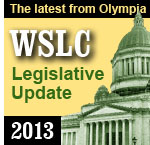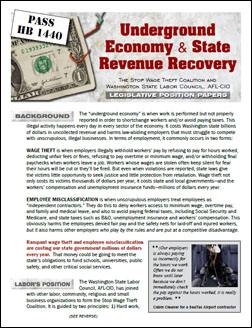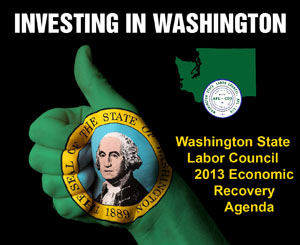STATE GOVERNMENT
WSLC Legislative Update: Recover underground revenue!
 Following is today’s edition of the Washington State Labor Council’s Legislative Update newsletter (download PDF version):
Following is today’s edition of the Washington State Labor Council’s Legislative Update newsletter (download PDF version):
OLYMPIA (Feb. 20, 2013) — Most agree that the biggest challenge facing the 2013 Legislature is balancing the budget while restoring education funding as ordered by the state Supreme Court. At the root of the challenge is the long-term structural revenue problem we have in Washington state. After all, the state economy continues to slowly but steadily recover from the recession and is outperforming those of many other states, yet we’re faced with yet another $1 billion revenue shortfall thanks to an outmoded tax structure that relies too heavily on people with the lowest incomes.
Few of the policy bills heard so far in 2013 can play a role in helping fix the long-term revenue problems facing our state. But HB 1440 is one of them.
 This bill, which got a second public hearing Monday in the House Finance Committee after previously passing out of the House Labor & Workforce Development, aims to address our underground economy, wage theft and employee misclassification. It’s all about cracking down on businesses that are cheating workers — and state and local governments — out of the money they are owed.
This bill, which got a second public hearing Monday in the House Finance Committee after previously passing out of the House Labor & Workforce Development, aims to address our underground economy, wage theft and employee misclassification. It’s all about cracking down on businesses that are cheating workers — and state and local governments — out of the money they are owed.
The underground economy is fueled by misclassification of workers as “independent contractors” and the shockingly common practice of wage theft where businesses simply refuse to pay for hours worked. Businesses that engage in these practices do so to avoid paying wages and taxes they should be paying. But ultimately they do so to undercut their honest competitors.
That’s why the Washington State Labor Council has joined with other labor, community, religious and small business organizations to form the Stop Wage Theft Coalition, which urges passage of HB 1440. Sponsored by Rep. John McCoy (D-Tulalip) and 26 others, HB 1440 would:
- Create a clear and more consistent definition of employee as compared with an independent contractor;
- Still allow legitimate independent contractors to maintain their independence;
- Ensure that employees can collect after they win cases for unpaid wages against their employers;
- Ensure victims of retaliation are protected under the law and have recourse; and
- Bring in the revenue owed to the state by catching employers who are cheating the system and their workers.
Wage theft and employee misclassification demand a solution based solely on the exploitation of workers denied their pay and basic protections like overtime pay, and workers’ compensation and unemployment insurance coverage. But given its benefits in revenue recovery and supporting honest employers, HB 1440 should be considered a win-win proposal for labor, business and all levels of government. The Stop Wage Theft Coalition strongly urges its passage from the Finance Committee so the full House can take up this important issue.
Labor-supported bills that need a vote
This Friday, Feb. 22 is the deadline for bills that are not budget related to advance from their policy committees. Call the Legislative Hotline at 1-800-562-6000 and leave a message urging that the following bills be advanced from their policy committees by Friday.
— HB 1026 (Rep. Jim Moeller) — Promoting the hiring of Washington resident workers on taxpayer-funded or subsidized public works projects. At least 75% of work hours on such projects would be state residents, although contractors could get a waiver if enough qualified local workers are not available. Hearing this Saturday (after cutoff) in House Labor and Workforce Development. Companion SB 5394 (Sen. Bob Hasegawa) has not received a hearing in the Senate.
— HB 1085 (Rep. Sherry Appleton) — Would establish a single-payer health system called the Washington Health Security Trust. In 2011, Vermont established Green Mountain Care, a single-payer system to be available to all of that state’s residents. As in Vermont, HB 1085 would allow Washington to seek an “innovation waiver” under the Affordable Care Act to provide universal coverage for specific health services for all of our state’s residents. Heard in House Health Care and Wellness. Companion SB 5224 (Sen. Jeanne Kohl-Welles) has not received a hearing in the Senate.
— HB 1095 (Rep. Tami Green) — Protects patient safety by establishing standards for safe nurse staffing levels at hospitals. This statewide safety standard would make sure that the heart of patient care — having enough nurses to care for patients — comes first and require CEOs to listen to their own staffing committee when more staff is required. Heard in House Health Care and Wellness.
— SB 5360 (Sen. Steve Conway) — Giving the Department of Labor & Industries some tools to provide for the collection of unpaid wages when those wages are illegally withheld by employers. Heard in Senate Commerce and Labor. Companion bill, HB 1467 (Rep. Tami Green), passed House Labor on Feb. 14.
 — SB 5029 (Sen. Bob Hasegawa) — Establishing the Washington Investment Trust, which can advance construction loans to local government entities for public infrastructure projects. Modeled after a successful state-run institution in North Dakota, SB 5029 would enable the state’s money to be at its own disposal, instead of parked at Bank of America or some other commercial bank. Heard in Senate Financial Institutions.
— SB 5029 (Sen. Bob Hasegawa) — Establishing the Washington Investment Trust, which can advance construction loans to local government entities for public infrastructure projects. Modeled after a successful state-run institution in North Dakota, SB 5029 would enable the state’s money to be at its own disposal, instead of parked at Bank of America or some other commercial bank. Heard in Senate Financial Institutions.
— SB 5395 (Sen. Steve Conway) — Applying prevailing wage standards to publicly subsidized projects. This ensures that taxpayer-subsidized work doesn’t reward contractors that undercut community wage standards. Heard in Senate Commerce and Labor. Companion bill, HB 1025 (Rep. Jim Moeller), passed House Labor on Feb. 13.
— SB 5429 (Sen. Maralyn Chase) — Creating some accountability for businesses that receive tax breaks for new or replacement machinery. This bill would require the subsidized business to demonstrate a net benefit to the state in terms of jobs created or maintained and the economic activity created. Heard in Senate Trade and Economic Development.
— SB 5482 (Sen. Karen Keiser) — Ensuring low-income workers have access to health coverage under the Affordable Care Act. It requires the state to monitor enrollment reports, by income and enrollment status, from the state’s new Health Benefits Exchange. If more than 10% of workers at or near the poverty threshold are uninsured, the state would implement the Federal Basic Health Option. Heard Monday in Senate Health Care.
Labor-supported bills that advanced
Following are status reports on some key labor bills that we’ve previously reported upon in this newsletter. Call the Legislative Hotline at 1-800-562-6000 and leave a message for your legislators, urging that the following bills receive floor votes in their respective houses.
— HB 1313 (Rep. Laurie Jinkins) — Establishing minimum standards for paid sick and safe leave, similar to what was recently enacted in the City of Seattle, but for all workers in Washington. Passed House Labor on Feb. 13 and is now in Appropriations. Companion SB 5594 (Sen. Nick Harper) is scheduled for a hearing in Senate Labor on Feb. 20.
— HB 1413 (Rep. Luis Moscoso) — The Washington Voting Rights Act empowering local governments to voluntarily change their voting systems to district-based elections in order to avoid the exclusion of certain communities. Passed House Government Operations on Feb. 12. Now before House Rules.
— HB 1457 (Rep. Tami Green) — Implementing Washington’s currently inactive Family and Medical Leave Insurance program. Passed House Labor on Feb. 13, now in Finance. Companion SB 5292 (Sen. Karen Keiser) is scheduled for a hearing in Senate Labor on Feb. 20.
— HB 1536 (Rep. Larry Seaquist) — Guaranteeing a labor representative serves on community college boards, as is already required at state technical colleges. This will create consistent, well-rounded representation on all of the colleges’ boards. Passed House Higher Education on Feb. 14, now in Rules. Companion SB 5567 has not received a hearing in the Senate.
House Democrats unveil transportation package today
Today, Rep. Judy Clibborn (D-Mercer Island), chair of the Transportation Committee, is formally unveiling the House Democrats’ $6 billion transportation package for 2013. Representatives of a labor-business coalition, including the Washington State Labor Council, alongside local government leaders who support a robust investment in our transportation system, will appear alongside Clibborn to support the package.
 “This represents a very good first step in addressing the $50 billion in identified needs to restore Washington’s crumbling transportation infrastructure,” said WSLC President Jeff Johnson. “We congratulate Representative Clibborn and the House Democratic leadership for stepping up to this challenge.”
“This represents a very good first step in addressing the $50 billion in identified needs to restore Washington’s crumbling transportation infrastructure,” said WSLC President Jeff Johnson. “We congratulate Representative Clibborn and the House Democratic leadership for stepping up to this challenge.”
Clibborn said the goal is to get enough bipartisan support for the package in both houses that the proposal doesn’t have to be put to a public vote, a goal shared by Gov. Jay Inslee and the labor-business coalition.
“This is a serious crisis our state is facing,” Johnson added. “We need to address it now right here in Olympia.”
Legislative Reception/Conference is Mar. 6-7
The Washington State Labor Council’s 2013 Legislative Reception and Legislative Conference will be March 6-7 at the Olympia Red Lion Hotel.
The Legislative Reception is Wednesday, March 6 from 6:30 to 8:30 p.m. at the Olympia Red Lion Hotel. This is a great opportunity to talk informally with legislators, state officials and other trade unionists.
The Legislative Conference starts at 8:30 a.m. on Thursday, March 7 and will feature updates from union lobbyists about bills affecting working families. Legislative leaders will discuss the prospects for passing bills and budgets that invest in our state, create good jobs and protect our families. In the afternoon, plan to head to the Capitol to talk with your legislators.
The registration fee for both events is $75 per person, which includes two drinks and hors d’oeuvres at the reception and lunch and materials at the conference. If you want to bring additional guests to the reception, there is a $15 per person fee.





